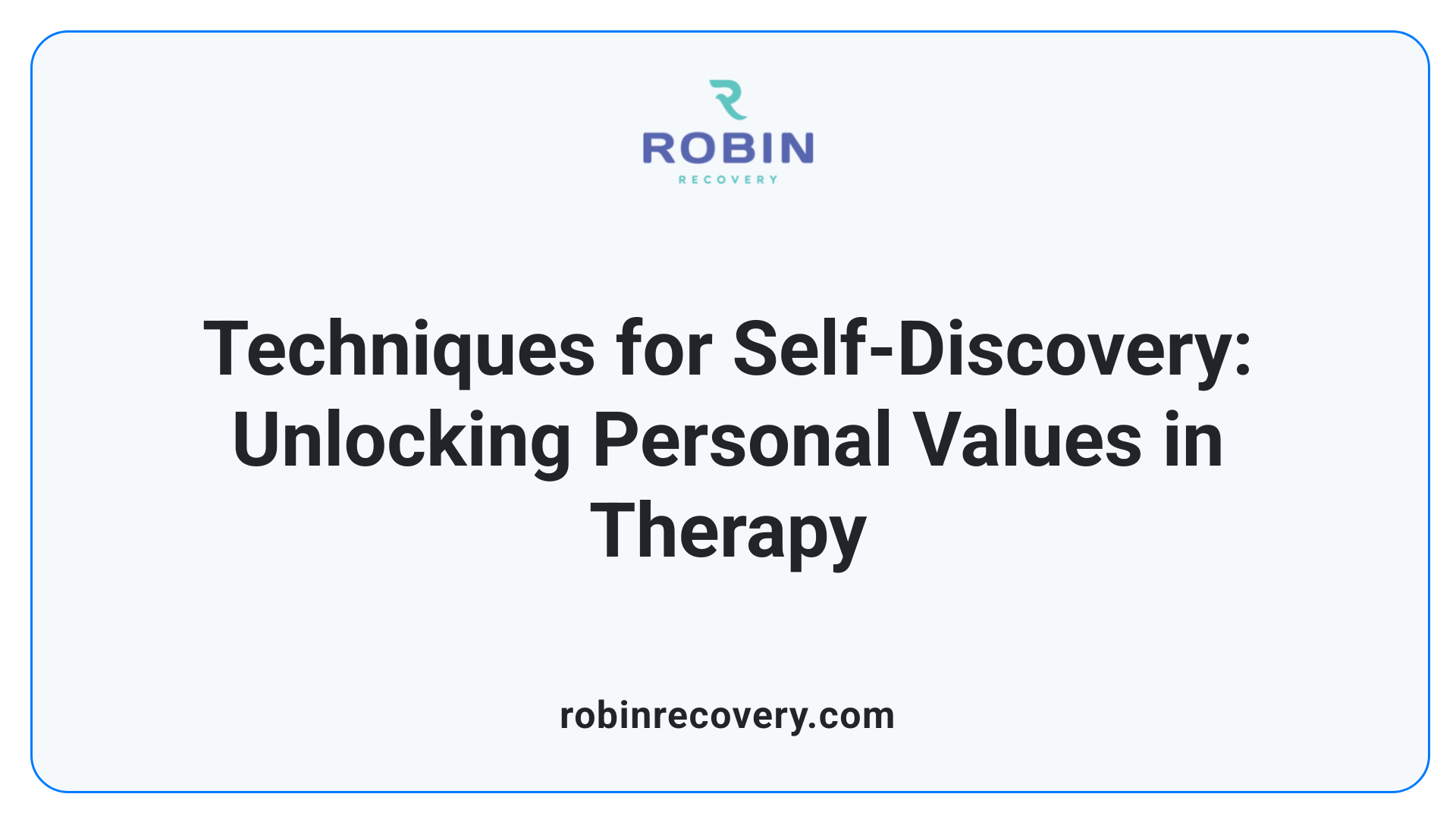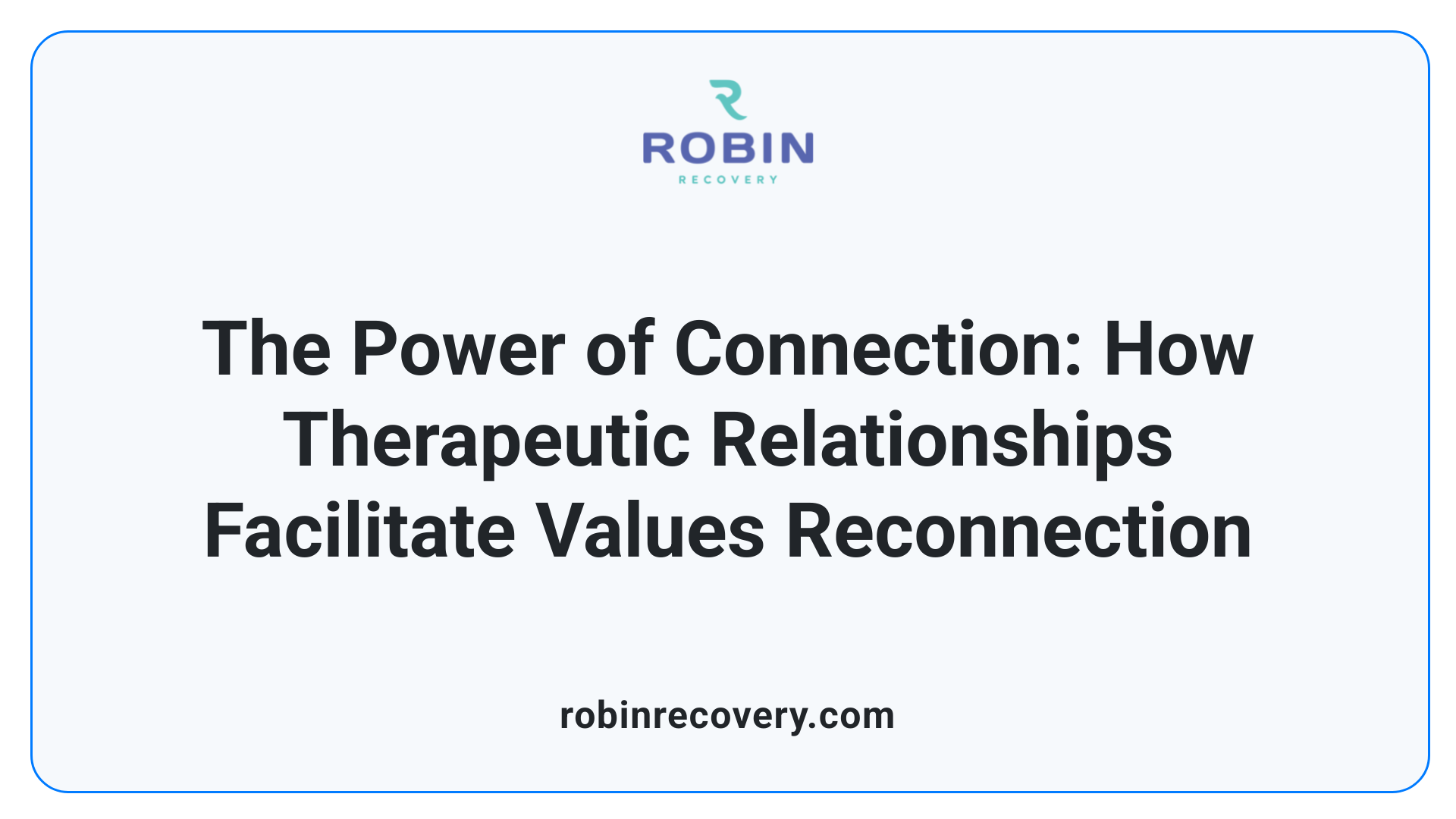How therapy helps individuals reconnect with their values

Understanding the Heart of Values in Therapy
Therapy is more than a space for addressing psychological distress; it is a transformative journey that facilitates reconnection with one’s core personal values. Central to this process is the development of a supportive, trusting therapeutic relationship that empowers individuals to explore their inner lives, recognize their authentic selves, and navigate life's challenges with purpose and resilience.
Foundations of Person-Centered Therapy and Its Role in Values Reconnection

What are the core concepts of person-centered therapy?
Person-centered therapy, created by psychologist Carl Rogers in the 1950s, revolves around three fundamental principles: unconditional positive regard, empathetic understanding, and genuineness—or congruence. These core conditions foster a safe and supportive environment in which clients feel accepted and understood.
The approach views clients as the experts of their own lives. The therapist's role is non-directive, meaning they do not steer or instruct but instead provide a genuine presence that facilitates self-exploration. This environment encourages individuals to delve deeply into their thoughts and feelings, promoting self-awareness and personal growth.
Rogers believed every person has innate resources for understanding themselves, managing their behavior, and realizing their potential. The therapy nurtures these abilities by establishing trust, acceptance, and a climate of psychological safety.
The five essential conditions for meaningful change include:
- Psychological contact between therapist and client,
- Client experiencing incongruence or discomfort,
- Therapist demonstrating congruence or genuineness,
- Unconditional positive regard from the therapist,
- Therapist's empathic understanding of the client’s experience.
Through these principles, person-centered therapy encourages individuals to reconnect with their inner values, fostering authenticity and autonomy. This process supports clients in aligning their actions with their true selves, leading to a more meaningful and self-directed life.
Strengths and Limitations of Person-Centered Therapy in Values Exploration
What are the strengths and limitations of person-centered therapy?
Person-centered therapy, developed by Carl Rogers in the 1950s, stands out for its emphasis on creating a safe, accepting environment that nurtures deep self-awareness and trust. This approach encourages clients to freely explore their thoughts, feelings, and values without judgment, fostering authenticity and self-acceptance. As a result, individuals often experience significant personal growth, improved self-understanding, and healthier relationships.
One of its main strengths lies in helping clients reconnect with their inner selves, aligning their actions with their core values. The core conditions of genuineness, empathy, and unconditional positive regard set the stage for self-actualization and autonomous decision-making, empowering individuals to live in accordance with their true selves.
However, person-centered therapy does have its limitations. Its non-directive, unstructured style may not suit clients with severe mental health conditions, personality disorders, or those seeking rapid intervention. Because it relies heavily on the client's capacity for self-exploration, it may be less effective for individuals needing more guidance or specific techniques. Additionally, some critics argue that its principles can be somewhat vague and lack the empirical rigor of structured therapies like Cognitive Behavioral Therapy (CBT). While benefiting from strong theoretical foundations, scientific support for humanistic therapies remains less extensive compared to evidence-based approaches for many mental health issues.
In summary, person-centered therapy excels in fostering a trusting environment that promotes authenticity and personal growth, especially valuable when exploring values. Yet, its effectiveness can vary depending on the individual's needs and the nature of their psychological challenges.
Techniques of Person-Centered Therapy that Facilitate Self-Discovery and Values Clarification

Person-centered therapy employs specific techniques designed to create a supportive environment for self-exploration and clarity of personal values. Central to this approach are active listening and reflective listening. The therapist attentively listens to the client's words, then paraphrases or restates their statements to ensure understanding and validate their feelings. This process encourages clients to express themselves openly and honestly.
Unconditional positive regard is another foundational technique, where the therapist accepts the client fully without judgment or conditions. This acceptance helps clients feel safe and valued, making it easier for them to explore difficult emotions or beliefs that might otherwise be suppressed.
Genuineness or authenticity from the therapist is crucial as well. When therapists share appropriate feelings or demonstrate genuine interest, it enhances trust and models honest engagement.
Beyond these core skills, the use of open-ended questions and non-directive methods allows clients to guide their own exploration. Instead of giving advice or directing the conversation, therapists ask questions that prompt deeper reflection, encouraging individuals to identify their own values and desires.
These techniques collectively foster a non-judgmental space where clients can uncover what truly matters to them. Such self-discovery is vital for reconnecting with core values and making authentic life choices.
Technique Description Purpose Active Listening Therapist attentively listens and paraphrases Deepens understanding and validation Unconditional Positive Regard Acceptance without judgment Builds safety and trust Empathic Understanding Demonstrating genuine empathy Fosters openness and self-exploration Open-Ended Questions Asking questions that encourage elaboration Promotes self-awareness and value clarification Non-Directive Approach Therapist guides minimally, allowing client-led discussion Empowers personal discovery
The Importance of Personal Values in Psychotherapy and How They Are Explored
Why are personal values important in therapy?
Personal values are fundamental in therapy because they act as guiding principles influencing decisions, behaviors, and overall purpose in life. When a therapist helps a client explore and clarify their core values, it becomes easier to understand what truly matters to them. This insight fosters greater self-awareness, enabling clients to live more authentically.
Values serve as a foundation for setting meaningful goals. For example, a person who values honesty may make different life choices than someone who prioritizes security. Acting in alignment with these values can strengthen resilience, especially during difficult times, and promote emotional well-being.
Moreover, understanding personal values helps individuals navigate life's challenges with a clear sense of purpose. It encourages ethical decision-making and supports ongoing personal growth. By integrating values into therapy, clients can lead more fulfilling lives rooted in authenticity and purpose, which ultimately enhances their overall mental health and life satisfaction.
Tools and Exercises that Support Values Clarification in Therapy

What tools and exercises are used in therapy to help clarify values?
Therapists employ a variety of practical exercises and tools to assist clients in uncovering and understanding their core values. One of the most common methods is the use of values diaries or journals. Clients are encouraged to record daily reflections, thoughts, and experiences that relate to what they find meaningful or important in life. These entries help increase self-awareness and highlight patterns that reveal underlying values.
In addition to journals, therapists often utilize structured worksheets. Examples include 'Personal Values Circles,' where clients identify key areas of their life—such as family, health, career, or spirituality—and rank their importance. 'Values Discussion Cards' facilitate conversations that explore what clients prioritize and how these priorities influence their decisions. Reflection exercises, such as listing and ranking values by significance, further aid clients in aligning their actions with their true desires.
Guided visualization and experiential activities are also effective. Role-play scenarios allow clients to practice acting according to their values in a safe environment, enhancing confidence and clarity. Visualization exercises help clients imagine living their ideal life aligned with their core beliefs. Moreover, therapists may facilitate discussions exploring different life domains—like relationships, health, or personal growth—to help clients evaluate whether their current lifestyle reflects their true priorities.
Overall, these tools foster deeper consciousness of personal values, guiding clients toward behavior and goal setting that authentically represent their individual aspirations.
The Therapeutic Relationship as a Catalyst for Values Reconnection

What role does the therapeutic relationship play in supporting individuals to reconnect with their values?
The bond established between a therapist and a client is fundamental in helping individuals reconnect with their core values. This relationship creates a secure environment where clients feel safe to express their deepest thoughts and feelings. Trust, empathy, and safety form the bedrock of this alliance, making it possible for clients to explore and clarify what truly matters to them.
A supportive and non-judgmental atmosphere encourages open dialogue, allowing clients to uncover underlying beliefs and desires. Through active listening and genuine understanding, therapists foster an environment of warmth and acceptance. This emotional safety is essential for genuine self-exploration and facilitates clients' ability to identify their values clearly.
Collaboration further enhances this process. When therapists and clients work together—setting shared goals and providing mutual feedback—clients feel more engaged and empowered. This partnership helps clients take ownership of their growth and commits them to taking meaningful actions aligned with their values.
Responding to clients' needs with attunement, understanding, and responsiveness also plays a vital role. When therapists accurately perceive and adapt to their clients’ emotional states, they build a stronger alliance that motivates clients to pursue change actively.
Recognizing and repairing any ruptures in this relationship not only rebuilds trust but also demonstrates care and commitment from the therapist. This ongoing process of nurturing the relationship directly supports clients in aligning their day-to-day behaviors with their deeper values.
In essence, a well-established therapeutic alliance acts as a catalyst, helping clients break free from distress and reconnect with what truly matters in their lives. It empowers them to develop greater self-awareness, resilience, and purpose, ultimately leading to more meaningful, lasting change.
Integrating Values and Personal Purpose into Daily Life Through Therapy

Therapy provides valuable strategies for incorporating personal purpose into everyday activities, decision-making, and behaviors. Central to this process are techniques that focus on clarifying and living in accordance with core values. Therapists support clients in defining their important values through exercises like worksheets, reflective journaling, and guided conversations, which enhance self-awareness.
A practical step involves creating a hierarchy of values, where individuals prioritize what matters most to them. This prioritization helps translate values into concrete goals and daily actions. For example, someone who values family may set specific intentions to spend quality time with loved ones regularly or communicate more openly.
Maintaining ongoing reflection, practicing mindfulness, and setting incremental goals are crucial for embedding purpose into daily life. Mindfulness practices heighten present-moment awareness and help individuals notice whether their actions align with their values.
Therapists also assist clients in developing personalized action plans that embody their core beliefs. These plans outline specific behaviors and routines—like engaging in community service if community connection is a value—that reinforce a purpose-driven life.
How do therapy techniques help individuals address personal challenges through values-based living? Therapy methods such as Acceptance and Commitment Therapy (ACT) and Values-Based Therapy (VBT) emphasize understanding one's core values and translating them into actionable steps. These approaches guide clients to make choices aligned with their authentic selves, even in facing difficulties.
By exploring and implementing value-based actions, clients build resilience and a sense of fulfillment. Living intentionally helps them navigate adversity, reduce stress, and foster emotional well-being. In this way, therapy supports ongoing growth and aligns daily life with what matters most, creating a meaningful and authentic existence.
Embracing a Values-Driven Life Through Therapeutic Practice
Therapy serves as a vital pathway for individuals seeking to reconnect with their intrinsic values and live with authenticity and purpose. Through a combination of trust-building relationships, reflective exercises, and targeted techniques, individuals gain clarity about what truly matters, enabling them to make intentional choices that lead to personal growth and emotional well-being. As clients deepen their understanding of their core principles, they are better equipped to face life's challenges with resilience, forge meaningful relationships, and cultivate a life aligned with their deepest aspirations.
References
- How Therapy Can Help: Values and Benefits
- Values Clarification in CBT and Beyond: 18+ Examples & Tools
- How Your Values Work with Counseling Hand in Hand
- Values: Connecting To What Matters - Psychology Tools
- Therapy Your Guide to Finding Purpose in Everyday Life
- Trauma Therapy Helps: Confidence and Emotional Stability
- Values-Based Behavioral Therapy - Child and Family Institute
- Understanding psychotherapy and how it works
- Person-Centered Therapy (Rogerian Therapy) - StatPearls - NCBI
- The Role of Therapy in Mental Health: What You Need to Know
